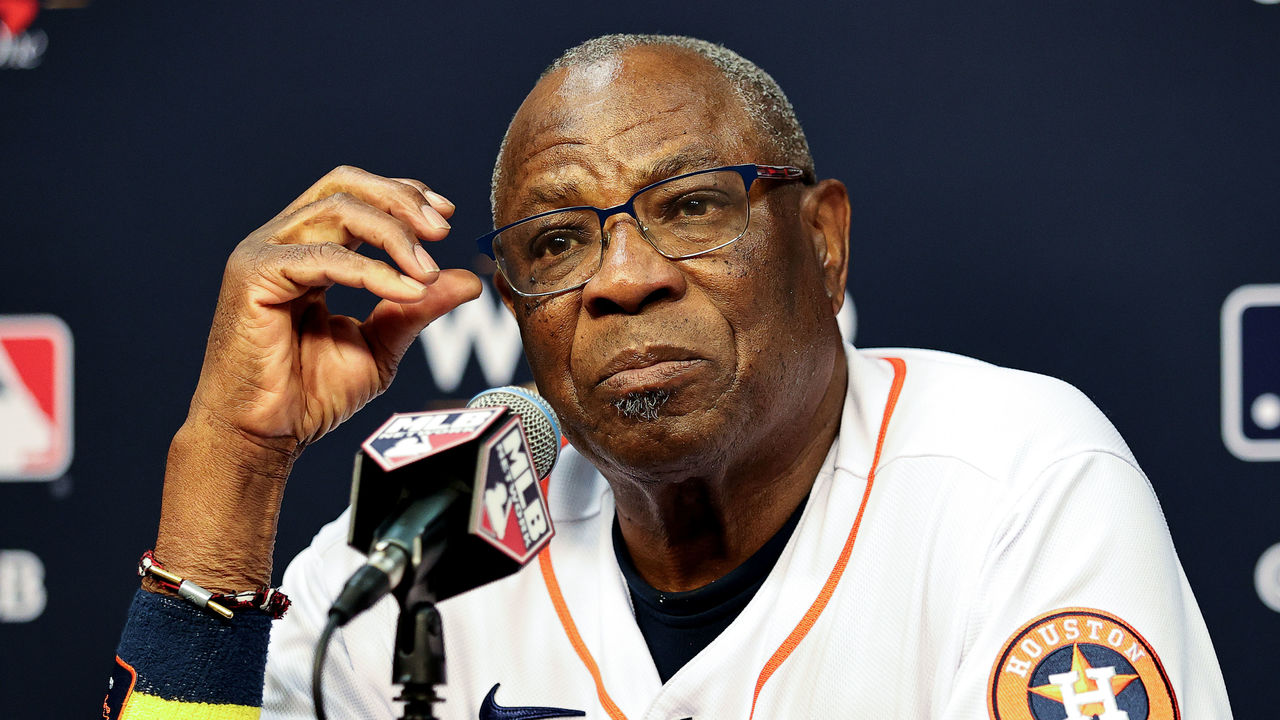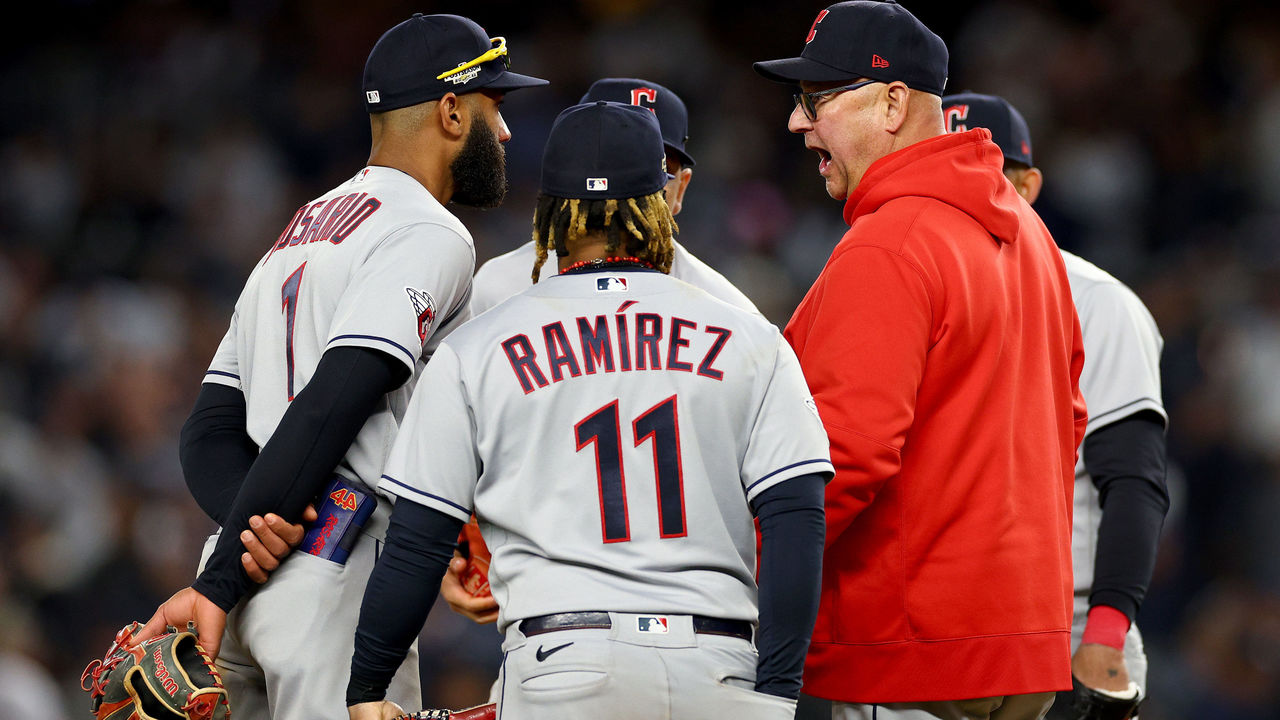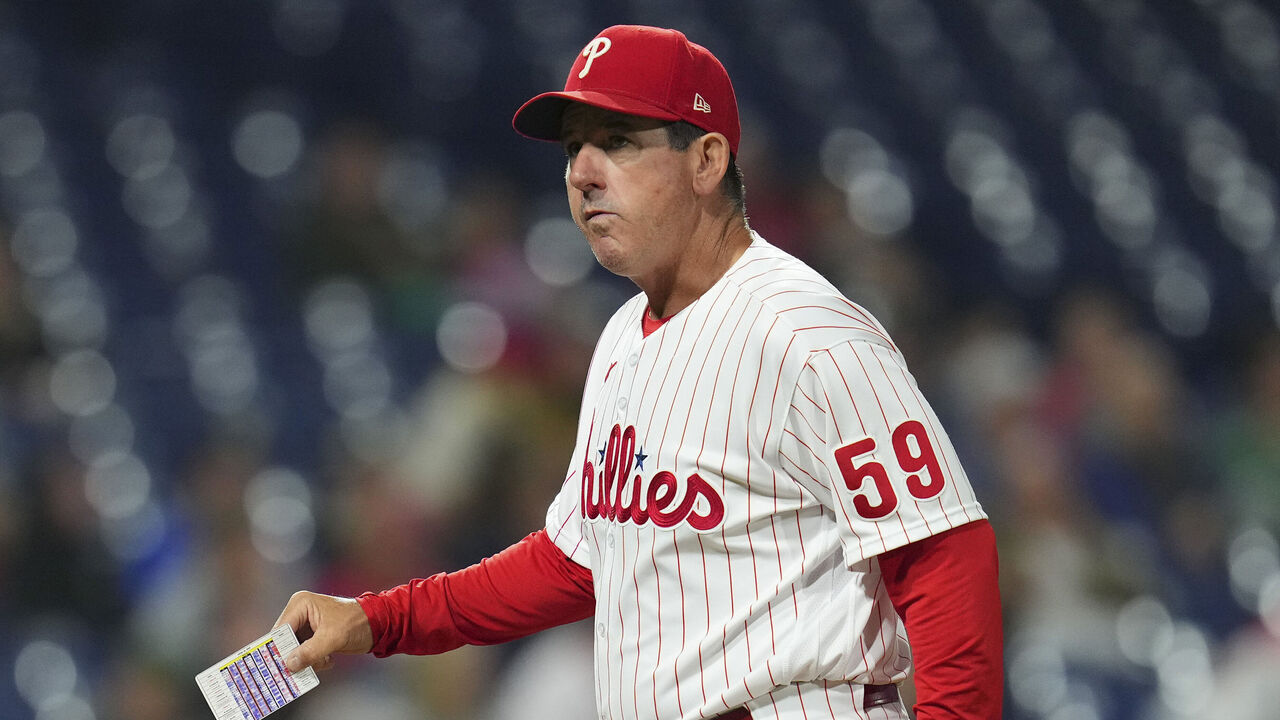A guide on how to - and how not to - manage pitching in the postseason
A number of managers in this year's postseason have lacked urgency in their decision-making. They've handled their pitching staff like it's mid-July and not October (and now November).
It continued in Game 3 of the World Series on Tuesday with Houston manager Dusty Baker.
Despite Astros starting pitcher Lance McCullers Jr. essentially tossing batting practice - he allowed three home runs in the first two innings - Baker let him work a traditional starter's workload, with McCullers pitching into the middle of the game. In the fifth, Kyle Schwarber's home-run ball might have landed at Independence Hall had the batting eye not been in the way. Rhys Hoskins followed with another homer.
McCullers allowed five home runs - a World Series record. And it's not like Baker didn't have an alternative: The Astros enjoyed the best bullpen by ERA (2.80) and FIP (3.05) this season, and their relievers were third by WAR (7.6). Baker should have leaned on it early, at the first sign of trouble.
Speculation was that McCullers was tipping his pitches, but, regardless, he didn't have it. He was hesitant to throw any fastballs to left-handed hitters, and when he did throw them to right-handed batters, they often connected like Alec Bohm did in the second inning.
McCullers hadn't trusted his fastball all season, throwing it at a 25% rate. (It was down to 17.9% Tuesday.) His sinker performance was among the worst in baseball this season. During Hoskins' in-game interview, he said they were sitting on soft stuff from McCullers. The Phillies had zeroed in on something from the first pitch.

The consequence of taking the traditional approach to McCullers' innings - along with the Astros' bats going silent - was a steep one: The winner of Game 3 when a seven-game series is tied 1-1 wins the series 69% of the time, and 62% of the time with the 2-3-2 format, according to MLB's Sara Langs. (There's no data on what happens when the visiting team throws a combined no-hitter in Game 4 of the World Series on the road to tie it 2-2, one night after being shut out.)
But Baker isn't alone in fumbling decisions by treating October too much like April through September. A number of managers are writing how-not-to guides in handling key pitching decisions this postseason.
In the deciding Game 5 of the NLCS against the Phillies, San Diego manager Bob Melvin elected not to have Philadelphia star Bryce Harper face one of the game's best left-handed relievers, Josh Hader. Harper was 30% less effective against lefties this season based on wRC+ (148 to 117).
Harper, performing at a torrid level this postseason, hit the go-ahead (and game-winning) home run off right-hander Robert Suarez.
Hader didn't pitch in the game. In fact, in the entire series, Hader pitched only one inning of the 42 thrown by the Padres. While Hader did struggle after coming over from Milwaukee at the trade deadline, he's been MLB's best lefty reliever since 2018.
Cleveland had its own lack-of-urgency issues in the ALDS.
Guardians manager Terry Francona elected to start Aaron Civale, who struggled through an injury-plagued season, in Game 5. Even though Francona was hesitant to pitch ace Shane Bieber on short rest, which Bieber had never done, the situation screamed bullpen game, since relievers were one of the club's strengths. What Cleveland didn't want to do: face a situation in which Emmanuel Clase - the club's best arm - had to enter the most important game of the season with the team down big late.

What happened? Clase entered in the seventh inning with Cleveland down by four runs.
Again, where was the urgency? Why were these managers prisoners to conventional thinking? They mismanaged their most important game-level decision: how to leverage their pitching staff. This isn't even about analytics versus eye test; this is about making sure a team's best arms are pitching meaningful innings.
But one manager, the one with the least managerial experience, is writing a how-to guide this postseason.
While the merits of changing managers in-season can be debated, there's little doubt Phillies general manager Dave Dombrowski made a key decision replacing Joe Girardi with Rob Thomson in early June. Thomson, a 59-year-old rookie manager, is leveraging his best arms at appropriate times within the game. He's managing like every night is do or die.
Consider Game 1 of the World Series. Thomson pulled ace Aaron Nola, who was laboring, with one out in the fifth inning. The Phillies scored two runs in the top of the fifth to tie the game 5-5, and Nola began the fifth by striking out the right-handed Jeremy Pena. But Thomson summoned lefty Jose Alvarado to face left-handed Astros hitters Yordan Alvarez and Kyle Tucker, who were two of the next three hitters.
Alvarado hadn't been used in a regular-season game before the seventh inning since May 1, but Thomson correctly decided the situation called for him. Thomson wanted his best option pitching in a crucial situation. Alvarado retired all three batters he faced.

Thomson continued to place all his focus on Game 1 when he went to Ranger Suarez, his other power lefty, in relief in the seventh and eighth to face Alvarez and Tucker their next time through the order. Suarez was scheduled to pitch Game 3, but Thomson wasn't worried about that.
As it turned out, Monday's rainout allowed Suarez to start Game 3 without issue, and he was excellent. But urgency was prudent: Game 1 winners enjoy a significant advantage in series outcomes.
Earlier in October, in the deciding Game 5 of the NLDS, Thomson employed Suarez creatively, too.
Thomson wasn't wrapped up in labels or roles when he summoned Suarez to come in with one out and two on in the bottom of the ninth and the Phillies hanging on to a one-run lead. Suarez hadn't pitched in relief at all during the regular season and hadn't earned a save since 2021. Yes, he was helped by an inexplicable Trent Grisham bunt, but Suarez slammed the door. It worked.
This might seem obvious but it's important for managers to forget regular-season roles and make sure their best arms are pitching meaningful innings.
It's difficult to know, from the outside, the leadership value each manager adds to his respective club. It's difficult to know what kind of work environment the manager creates in the clubhouse, and how that might help performance. But what we can measure and evaluate are decisions a manager makes within a postseason game and a series. And this fall, a rookie manager with the least experience is writing a guide on how to manage a staff in October.
Travis Sawchik is theScore's senior baseball writer.